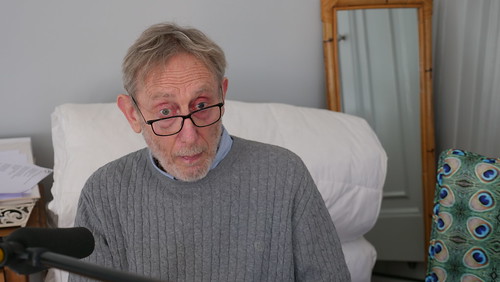Michael Rosen praised for his moving tribute to the NHS during BBC Breakfast
Michael Rosen #MichaelRosen

Michael Rosen has sung the praises of the NHS, which celebrates its 75th birthday this July.
The children’s author appeared on BBC Breakfast on Wednesday (5 July) to speak about the NHS ahead of its 75th anniversary
Rosen, 77, recalled his own numerous encounters with the NHS over the years.
Most recently, the former Children’s Laureate spent approximately 40 days in an induced coma after he contracted Covid in 2020.
“I was one of the Covid pioneers and I dipped, got very bad, they put me in intensive care,” said Rosen. “I was in a coma for 40 days and they saved my life, that’s the long and short of it – saved my life probably two or three times in that time I was in a coma.”
Asked how he is currently doing three years on, Rosen said: “Not bad. Not bad at all.”
He did, though, say that “Covid knocked my eye and ear out”, explaining that he had microbleeds in his brain that limited his hearing and eyesight on one side. Rosen said that he now wears a hearing aid.
“You’re kind of on the wrong side of me actually, I can hardly see or hear you,” Rosen told hosts Sally Nugent and Jon Kay. He joked: “It’s OK! I’ll turn my head around.”
Poet Michael Rosen during a protest in Whitehall, London, during the nurses strike, against the Bill on minimum service levels during strikes (Yui Mok/PA) (PA Wire)
Rosen went on to recall his first encounter with hospitals, calling the moment “a bit of a joke actually”.
“I was playing cricket at school and I was very near the bat and the ball whacked my nose,” he said, adding that the surgeon took a “rubber hammer” to his “bent nose” and “banged it” back into shape.
He also recalled the death of his son, “dear” Eddie, who died aged 18 in 1999.
“With that, it happened so quickly. Basically I put him to bed with what felt like the flu and then in the morning he was dead,” Rosen said of the circumstances surrounding his son’s death.
“What I had to do was find out how he died, I wanted to know what doctors knew. I went to the NHS to find out how he died, which was meningitis,” he said. “To find that out was very important and talk to our GPS was very helpful as well.”
Rosen added that he has found writing about such difficult life events to be “incredibly helpful”.
“I call it unfolding, it’s a way for me to describe how you don’t have to write in long, dressy sentences, you can write about things very simply,” said the author.
Rosen continued: “For example, when I came out of the coma, doctors kept coming up to my bedside and saying you were very poorly. And I remember thinking, ‘Do they mean I was a bit fluey or I nearly died?’ I thought it was quite funny that they used this word.”
(AFP/GETTY IMAGES)
Asked whether he remembers anything from the time he was in the hospital in the coma, Rosen said: “The interesting thing about being in a coma is you don’t really remember anything. It’s quite funny.”
Elsewhere in the BBC Breakfast segment, Rosen recited his poem These Are the Hands, which he wrote for the NHS’s 60th anniversary.
He said that 15 years on, the poem remains relevant today.
Viewers at home praised Rosen for his moving NHS tribute.
“Wonderful Michael Rosen on BBC Breakfast cheering the #NHS – celebrating 75 years! Telling his story – the times the NHS has helped him and even saved his life from Covid,” wrote one person.
Another added: “Michael Rosen is on BBC Breakfast. What a joy of a man he is.”
“Eloquent about having severe Covid,” said a third person. “Man talks as fish swim, as Nancy Banks-Smith might say.”
Nancy Banks-Smith is a British television and radio critic, who reguarly wrote for The Guardian in her career.
Last week, Rosen appeared as a guest on an episode of BBC’s The Repair Shop. He brought in his NHS patient diary, which nurses wrote in when he was in his coma.
Bookbinder Christopher Shaw set about fixing Rosen’s diary, whose pages were in danger of falling apart.
Following his recovery from Covid, Rosen wrote a book called Many Different Kinds of Love, detailing his experience with the virus.
In January, he marched with striking nurses from University College Hospital in north-west London to Downing Street out of “pure gratitude” for them saving his life.